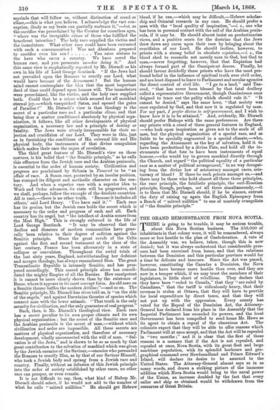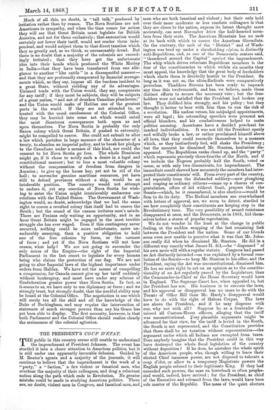THE GRAND REMONSTRANCE FROM NOVA SCOTIA.. T HERE is going to
be trouble, it may be serious trouble, about this Nova Scotian business. The 350,000 of ' inhabitants in that colony were, it will be remembered, always more or less hostile to the plan of Confederation. A vote of the Assembly was, we believe, taken, though this is now denied; but it was always understood that considerable pres- sure had been exercised from home, and that the relations between the Dominion and this particular province would for a time be delicate and insecure. Since the Act was passed, however, constituting the Canadas a Dominion, the Nova Scotians have become more hostile than ever, and they are now in a temper which, if we may trust the members of their legislature, is little short of rebellious. They declare that they have been "ceded to Canada," that they "are ruled by Canadians," that the tariff is ridiculously heavy, that their revenue is stolen at Ottawa, that they will have to provide for local expenditure by direct taxes, and that they will not put up with the oppression. Every county has- voted for the Repeal of the Dominion Act, the Attorney- General has declared from his place in the Assembly that the Imperial Parliament has exceeded its powers, and the local Government has been compelled to send home Mr. Howe as- its agent to obtain a repeal of the obnoxious Act. The expect that they will be able to offer reasons which. Parliament will at once accept, and that the Act will be repealed in "two months ;" and it is clear that the first of these- reasons is a menace that if the Act is not repealed, and repealed at once, Nova Scotia, with its great fleet and large. maritime population, with its splendid harbours and geo- graphical command over Newfoundland and Prince Edward's. Island, will declare its desire to be annexed to the United States. The Attorney-General almost says so in so many words, and draws a striking picture of the immense addition which Nova Scotia would bring to the naval power of the Union, an increase doubled by the fact that every sailor and ship so obtained would be withdrawn from the resources of Great Britain. Much of all this, no doubt, is "tall talk," produced by irritation rather than by reason. The Nova Scotians are not Americans in sympathy, and when the time comes for action they will see that Great Britain must legislate for British America, and not for them exclusively; that annexation would certainly not lower their tariff, would not render them inde- pendent, and would subject them to that direct taxation which they so greatly and, as we think, so unreasonably dread. But there is no doubt that a majority of the colonists are exceed- ingly irritated ; that they have got the unfortunate idea into their heads which produced the White Mutiny in India—that they have been transferred from one alle- giance to another "like cattle" in a disrespectful manner— and that they are profoundly exasperated by financial arrange- ments which, as they say, impose all the burdens incident to a great State, without yielding any of its advantages. Untaxed trade with the Union would, they say, compensate for any tariff ; if they must be subjects, they will be subjects of a great nation, "and not of drunken Canadian plunderers ;" and the Union would make of Halifax one of the greatest ports in the world. If they are not attended to, or treated with the usual carelessness of the Colonial Office, they may be hurried into some act which would entail the most disastrous consequences both upon us and upon themselves. For Nova Scotia is probably the only Saxon colony which Great Britain, if pushed to extremity, might be compelled to coerce. She could not submit to alter a law which partakes in large measure of the character of a treaty, to abandon an imperial policy, and to break her pledges to the Canadians under a menace of this kind, nor could she consent to let Nova Scotia go free. The whole Dominion might go, if it chose to notify such a desire in a legal and constitutional manner ; but to lose a most valuable colony without the compensation of freedom from dangers in America ; to give up the house key, yet not be rid of the hail; to surrender genuine maritime resources, yet have still to defend provinces without a ship, would be an intolerable position. The country would not attempt to endure it, yet any coercion of Nova Scotia for wish- ing to enter the Union might irretrievably embarrass our relations with the United States. The Government of Wash- ington would, no doubt, acknowledge that we had the same right to coerce a revolted colony that itself had to coerce the South; but the sound of the cannon irritates men's minds. There are Fenians only waiting an opportunity, and in an hour Great Britain might be engaged in the most terrible struggle she has ever waged. Even if this contingency never occurred, nothing could be more unfortunate, more un- endurably annoying, than a positive obligation to hold one of the free colonies by force, or the menace of force ; and yet if the Nova &aims will not hear reason, what help ? We are not going to surrender the only nexus of the Empire—the right of the Imperial Parliament in the last resort to legislate for every human being who claims the protection of our flag. We are not going to alter Imperial laws of the highest importance under orders from Halifax. We have not the means of compelling a compromise, for Canada cannot give up her tariff suddenly without bankruptcy, and must have under any scheme of Confederation greater power than Nova Scotia. In fact, as it seems to us, we have only to use diplomacy or force ; and we strongly trust, but strongly doubt, that the needful ability may be found at the Colonial Office. The negotiation is one which will sorely tax all the skill and all the knowledge of the Duke of Buckingham, and may require the intervention of statesmen of much stronger powers than any his Grace has yet been able to display. The first necessity, however, is that both Parliament and the Colonial Office should realize clearly the seriousness of the colonial agitation.































 Previous page
Previous page